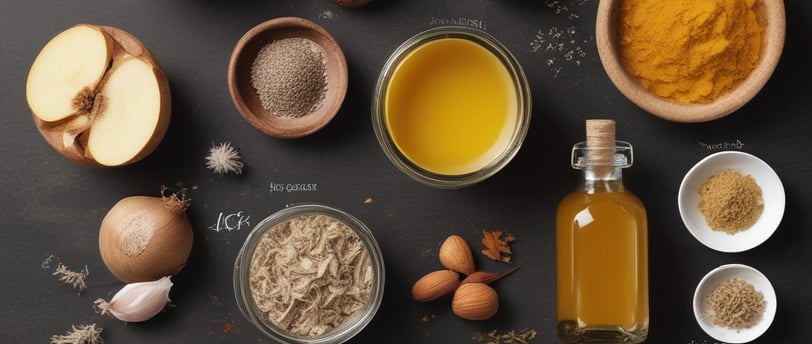Natural Antibiotics You Can Find in Your Kitchen
WELLNESS
4/3/20253 min read


When infections strike, most people instinctively reach for a bottle of antibiotics. But what if you're in a situation where access to modern medicine is limited? Whether it's a supply chain issue, a natural disaster, or simply wanting to reduce overuse of pharmaceuticals, natural alternatives found right in your kitchen can offer real support.
Let’s explore some powerful natural antibiotics you may already have in your pantry or garden.
Garlic – Nature’s Penicillin
Garlic contains allicin, a compound with potent antibacterial and antiviral properties. Studies have shown garlic is effective against a variety of bacteria, including E. coli and Staphylococcus aureus.
How to use: Crush a raw clove and let it sit for 10 minutes before eating to activate its medicinal properties. Add it to meals or take it raw with honey.
Ginger – Gut Friendly Defender
This post may contain affiliate links. If you click and make a purchase, I may earn a small commission at no extra cost to you. Thank you for supporting my blog!
Turmeric – Golden Antiseptic


Honey – Healing Sweetness
Raw honey, especially Manuka honey, has strong antibacterial and wound-healing properties. It can be used topically for burns, cuts, and infections.
How to use: Apply a thin layer to wounds or consume a spoonful daily to support immune health.


Ginger has been used for centuries to combat nausea and infections. Its active compounds gingerol and shogaol have antimicrobial and anti inflammatory benefits.
How to use: Brew fresh ginger tea, add it to smoothies, or chew slices for digestive issues.


This bright yellow spice contains curcumin, which has been studied for its antimicrobial and anti-inflammatory effects. It can help with internal inflammation and minor infections.
How to use: Combine with black pepper and a fat (like coconut oil) for better absorption. Add to soups, teas, or take as a supplement.


Oregano Oil – Potent Pathogen Fighter
Oil of oregano is a concentrated extract with compounds like carvacrol that can inhibit bacteria, viruses, and fungi. It’s especially effective for respiratory and digestive infections.
How to use: Take diluted oil in capsules or add a drop to a glass of water (use caution – it's potent!).


Apple Cider Vinegar – Acidic Antimicrobial
Raw, unfiltered apple cider vinegar has natural acids and enzymes that can combat harmful bacteria and support digestion.
How to use: Mix 1 tablespoon in a glass of water before meals to support gut health and immunity.


Coconut Oil – A Gentle Antifungal
This oil contains lauric acid, which can disrupt the cell membranes of certain bacteria, fungi, and viruses.
How to use: Use topically for fungal infections like athlete's foot or consume daily to support immune function.


Natural antibiotics can’t and shouldn’t replace professional medical treatment for serious infections. However, they’re powerful tools for supporting your body, preventing minor infections, and supplementing conventional care, especially when resources are limited.
Keeping a small natural pharmacy in your kitchen is one step toward household medical self-reliance.
If you're serious about preparing your home for medical emergencies—whether you're miles from the nearest doctor or just want to be ready The Home Doctor: Practical Medicine for Every Household is your must-have guide.
It’s written by real medical professionals with experience in extreme conditions and will teach you how to handle everything from infections to injuries when no help is on the way.
